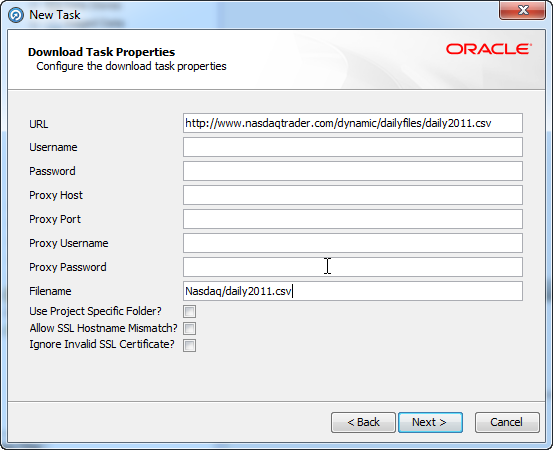
External Tasks are stored details of tasks that are run as part of OEDQ Jobs, but which do not occur within the OEDQ application.
An External Task may be either a File Download or an External Executable.
File downloads are used to capture files into the server landing area for processing in OEDQ. The files may be downloaded from the internet or from other network sources. User authentication details, and proxy/firewall settings where required, can be set as part of the file download task.
The complete set of options that may be set for a File Download task is as follows:
Specifies the location of the source file - this may be either an internet location or another network file location to which the server can connect
Specifies a user name, where authentication details are needed to download the file
Specifies a password, where authentication details are needed to download the file
The name or IP address of the proxy/firewall server, where the server is not directly connected to the internet/network
The port used to connect to the proxy/firewall server.
The user name used to authenticate to the proxy/firewall server.
The password used to authenticate to the proxy/firewall server.
The name to give the downloaded file when it has been downloaded to the landing area. Note that if you want to put the file in a subfolder in the landing area, use forward slashes to specify a directory structure (for example, DownloadedData/downloadedfile.csv).
Ticking this option will automatically put the file into a project-specific landing area. This is normally used where project permissions are in place, so that the landing area can only be accessed by processes within the same project.
Ticking this option will allow the download task to ignore discrepancies between the hostname specified in the SSL certificate and the name of the server to which it applies.
Ticking this option will allow the download task to ignore unverified SSL certificates on the host.
Finally, you can name the file download task and give it an optional description.
The below screenshot shows an example File Download task, downloading data from Nasdaq. In this case, no authentication details are required:

The following options may be set for an External Executable task:
This option specifies the command that you wish to execute. If the path to the command is not on the System Path of the OEDQ server, you must specify the full path to the command.
This option specifies any additional arguments you wish to provide for the command.
This option specifies the working directory on the OEDQ server where the command will execute. Any files that need to be read by the command must be present in this directory. Also, any files that are written by the command will be written to this directory. Note that if this option is left blank, the working directory for the command will be the server file landing area (which is set to [Install Path]\config\landingarea in a default installation).
Finally, you can name the executable task and give it an optional description.
A property named externaltasks.restricted is used to control the scope of external tasks. This property is set in the director.properties file and is set to true by default.
When externaltasks.restricted is set to true, commands used in external tasks must reside in the OEDQ command area. By default, the command area is found at config/commandarea. The location may be overridden by setting the commandarea property in director.properties.
Note that if an external executable needs to run a script, such as a perl script, the call must be wrapped in a batch file in the command area.
|
Warning: If externaltasks.restricted is set to false, the external executables mechanism represents a potential security hazard. In theory, anyone with access to the Director application could write an external job which has unlimited access to the server, including the ability to delete files, read sensitive data and so on. |
Oracle ® Enterprise Data Quality Help version 9.0
Copyright ©
2006,2012, Oracle and/or its affiliates. All rights reserved.